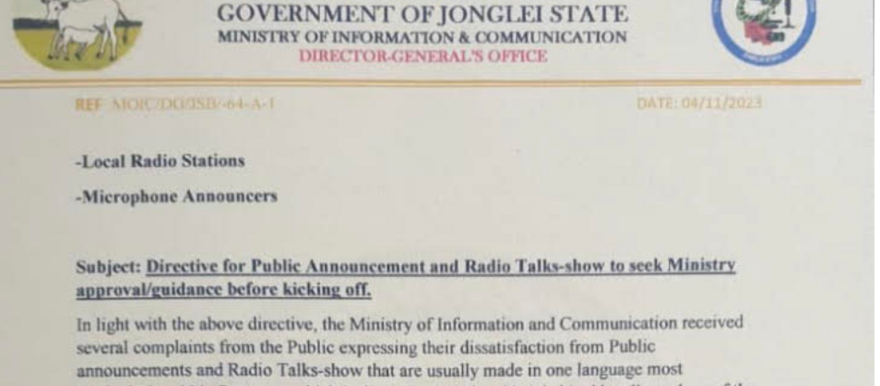A recent order by the Jonglei State Information Ministry requiring radio stations operating in Bor town to seek approval and guidance before airing public announcements and hosting talk shows has drawn sharp criticism.
Journalists and activists have since demanded that the order be immediately revoked.
On 4 November, the state’s information ministry issued a directive ordering the management of radio stations in Bor to seek their approval to broadcast certain material to avoid airing harmful content.
The state Information ministry’s director-general, Mahmoud Chuol Peter, said they do not intend to censor and or gag the radio stations but rather seek to cooperate with them.
“The ministry’s directive is very clear. What will need approval are announcements, whether through the radio or public microphones, so that the information to be consumed by the public is safe. The other thing is guidance. We will assign one of our staff to Radio Jonglei because it is the main radio station and it is facing many challenges,” he explained. “There is no censorship in Jonglei State. The radio stations themselves know what we mean. We just need cooperation. Again, we want all the three tribes in Jonglei State like the Nuer, Anyuak, and Dinka to be represented on talk shows and during public announcements.”
“We have been pushing for this since last year and this is why some people are making noise,” Chuol added.
Speaking to Radio Tamazuj on Wednesday, Bol Deng Bol, the head of Intrepid South Sudan and Jonglei Civil Society Network (JCSN), said the order lacks any legal basis and could amount to media censorship.
“It is not the first time such orders are issued. This is the second one in the same year. It is very unfortunate and amounts to media censorship,” he charged. “Asking the media to seek permission before they go on air with talk shows and announcements is limiting freedoms and independence of supposedly independent media houses.”
According to Deng, while the state government’s rationale for the order could be reasonable, its approach was dictatorial.
“We acknowledge the prevalence of hate speech in Jonglei State and across the country, and of course sometimes some media houses are indeed unethical but such orders are not solutions but problems in themselves,” the activist stated. “The best way to control hate speech is not to control the media. They should sit with media houses and come up with some regulations to control hate speech which is not only in media but also in public spaces.”
For his part, Majok Guet Kuol, the head of the Bor office of the Union of Journalists in South Sudan (UJOSS), demanded that the order be revoked, saying it was not legally binding and was censorship.
“After we saw the order on social media, we consulted with the management of radio stations and came up with a condemnation letter which we submitted to the state information ministry to revoke their order. The order does not reflect the freedom and independence of the media which is already being regulated by the Media Authority through media laws,” he said. “So, the state information ministry should not again regulate. If they have any complaints, they should report them to the Media Authority. A media house chooses a language based on its target audience.”
“Also, if it is a question of qualifications, then they should sit with the stations’ management because being unqualified does not justify radio stations to seek approval before conducting a talk shows,” Guet added.




